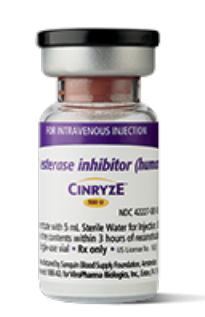Cinryze Side Effects
Generic name: C1 esterase inhibitor (human)
Note: This document provides detailed information about Cinryze Side Effects associated with C1 esterase inhibitor (human). Some dosage forms listed on this page may not apply specifically to the brand name Cinryze.
Applies to C1 esterase inhibitor (human): powder for solution.
Other dosage forms:
Precautions
It is very important that your doctor check your or your child's progress at regular visits to make sure that the medicine is working properly. Blood tests may be needed to check for unwanted effects.
HAE attacks are life-threatening and require immediate medical attention. Check with your doctor right away, or go to an emergency room as soon as possible, even if you feel better after using this medicine.
This medicine may cause serious allergic reactions, which can be life-threatening and require immediate medical attention. Call your doctor or nurse right away if you or your child have a rash, itching, hives, hoarseness, chest tightness, lightheadedness, dizziness or fainting, trouble breathing, trouble swallowing, or any swelling of your hands, face, or mouth after you receive this medicine.
This medicine may increase your risk of developing blood clots. Check with your doctor right away if you or your child have swelling and pain in your arms, legs, or stomach, chest pain, trouble breathing, loss of sensation, confusion, or problems with muscle control or speech.
This medicine is made from donated human blood. Some human blood products have transmitted certain viruses (eg, Creutzfeldt-Jakob Disease) to people who have received them, although the risk is low. Human donors and donated blood are both tested for viruses to keep the transmission risk low. Talk with your doctor if you have concerns about this risk.
Serious side effects of Cinryze
Along with its needed effects, C1 esterase inhibitor (human) may cause some unwanted effects. Although not all of these side effects may occur, if they do occur they may need medical attention.
Check with your doctor or nurse immediately if any of the following side effects occur while taking C1 esterase inhibitor (human):
More common side effects
- chest pain or tightness
- head congestion
- hoarseness or other voice changes
- nausea
- pain or tenderness around the eyes and cheekbones
- rash
- sore throat
- trouble breathing
- vomiting
Less common side effects
- bleeding gums
- collection of blood under the skin
- coughing up blood
- deep, dark purple bruise
- difficulty with swallowing
- dizziness
- hard lump
- headache
- increased menstrual flow or vaginal bleeding
- itching, pain, flushing, redness, or swelling of the skin
- nosebleeds
- paralysis
- prolonged bleeding from cuts
- red or black, tarry stools
- red or dark brown urine
- swelling
- unusually warm skin
Incidence not known
- confusion
- difficulty with speaking
- dizziness
- double vision
- fast heartbeat
- general tiredness and weakness
- hives
- inability to move the arms, legs, or facial muscles
- numbness or tingling in the face, arms, or legs
- pain, redness, or swelling in the arm or leg
- puffiness or swelling of the eyelids or around the eyes, face, lips, or tongue
- slow speech
- trouble speaking, thinking, or walking
Other side effects of Cinryze
Some side effects of C1 esterase inhibitor (human) may occur that usually do not need medical attention. These side effects may go away during treatment as your body adjusts to the medicine. Also, your health care professional may be able to tell you about ways to prevent or reduce some of these side effects.
Check with your health care professional if any of the following side effects continue or are bothersome or if you have any questions about them:
More common side effects
- diarrhea
- headache
- pain
- stomach pain
Less common side effects
- bleeding, blistering, burning, coldness, discoloration of skin, feeling of pressure, hives, infection, inflammation, itching, lumps, numbness, pain, rash, redness, scarring, soreness, stinging, swelling, tenderness, tingling, ulceration, or warmth at the injection site
- change in taste
- fever
- loss of taste
- muscle aches
- pain at the catheter site
- stuffy or runny nose
- unusual tiredness or weakness
See also:
For healthcare professionals
Applies to C1 esterase inhibitor (human): intravenous kit, intravenous powder for injection, subcutaneous powder for injection.
Respiratory adverse events
Respiratory side effects have included sinusitis, bronchitis, upper respiratory tract infection, and viral upper respiratory tract infection.[Ref]
Nervous system
Nervous system side effects have included headache.[Ref]
Musculoskeletal
Musculoskeletal side effects have included limb injury, back pain, and pain in extremity.[Ref]
Dermatologic
Dermatologic side effects have included pruritus.[Ref]
Cardiovascular
Cardiovascular side effects have included postmarketing reports of thrombotic events including deep vein thrombosis, myocardial infarction, and transient ischemic attack.[Ref]
References
1. (2022) "Product Information. Cinryze (C1 esterase inhibitor, human)." ViroPharma Incorporated
2. Gandhi PK, Gentry WM, Bottorff MB (2012) "Thrombotic events associated with C1 esterase inhibitor products in patients with hereditary angioedema: investigation from the United States Food and Drug Administration adverse event reporting system database." Pharmacotherapy, 32, p. 902-9
Frequently asked questions
- What is Cinryze used for and how does it work?
- What is Ruconest used for and how does it work?
- How is Berinert administered?
- How does Berinert work for Hereditary Angioedema (HAE)?
More about Cinryze (C1 esterase inhibitor (human))
- Check interactions
- Compare alternatives
- Pricing & coupons
- Reviews (3)
- Drug images
- Dosage information
- Patient tips
- During pregnancy
- FDA approval history
- Drug class: hereditary angioedema agents
- Breastfeeding
- En español
Patient resources
Other brands
Professional resources
Other brands
Related treatment guides
Further information
Cinryze side effects can vary depending on the individual. Always consult your healthcare provider to ensure the information displayed on this page applies to your personal circumstances.
Note: Medication side effects may be underreported. If you are experiencing side effects that are not listed, submit a report to the FDA by following this guide.

